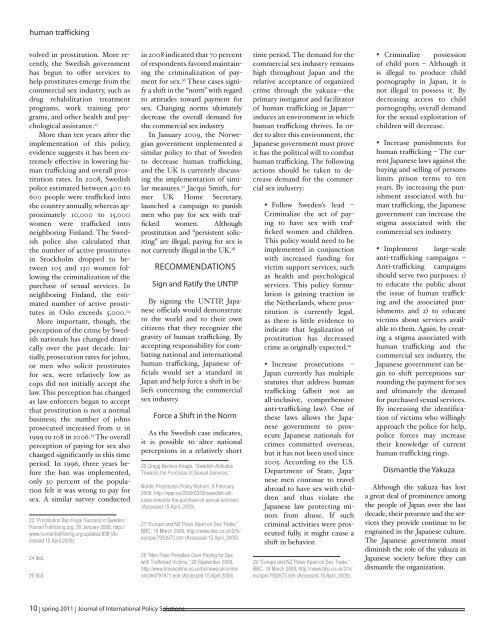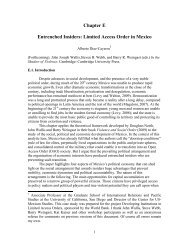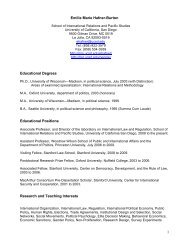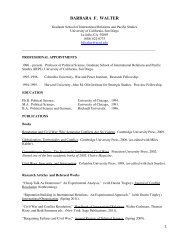to download the full journal. (1.2MB PDF) - School of International ...
to download the full journal. (1.2MB PDF) - School of International ...
to download the full journal. (1.2MB PDF) - School of International ...
You also want an ePaper? Increase the reach of your titles
YUMPU automatically turns print PDFs into web optimized ePapers that Google loves.
human trafficking<br />
volved in prostitution. More recently,<br />
<strong>the</strong> Swedish government<br />
has begun <strong>to</strong> <strong>of</strong>fer services <strong>to</strong><br />
help prostitutes emerge from <strong>the</strong><br />
commercial sex industry, such as<br />
drug rehabilitation treatment<br />
programs, work training programs,<br />
and o<strong>the</strong>r health and psychological<br />
assistance. 23<br />
More than ten years after <strong>the</strong><br />
implementation <strong>of</strong> this policy,<br />
evidence suggests it has been extremely<br />
effective in lowering human<br />
trafficking and overall prostitution<br />
rates. In 2008, Swedish<br />
police estimated between 400 <strong>to</strong><br />
600 people were trafficked in<strong>to</strong><br />
<strong>the</strong> country annually, whereas approximately<br />
10,000 <strong>to</strong> 15,000<br />
women were trafficked in<strong>to</strong><br />
neighboring Finland. The Swedish<br />
police also calculated that<br />
<strong>the</strong> number <strong>of</strong> active prostitutes<br />
in S<strong>to</strong>ckholm dropped <strong>to</strong> between<br />
105 and 130 women following<br />
<strong>the</strong> criminalization <strong>of</strong> <strong>the</strong><br />
purchase <strong>of</strong> sexual services. In<br />
neighboring Finland, <strong>the</strong> estimated<br />
number <strong>of</strong> active prostitutes<br />
in Oslo exceeds 5,000. 24<br />
More important, though, <strong>the</strong><br />
perception <strong>of</strong> <strong>the</strong> crime by Swedish<br />
nationals has changed drastically<br />
over <strong>the</strong> past decade. Initially,<br />
prosecution rates for johns,<br />
or men who solicit prostitutes<br />
for sex, were relatively low as<br />
cops did not initially accept <strong>the</strong><br />
law. This perception has changed<br />
as law enforcers began <strong>to</strong> accept<br />
that prostitution is not a normal<br />
business; <strong>the</strong> number <strong>of</strong> johns<br />
prosecuted increased from 11 in<br />
1999 <strong>to</strong> 108 in 2006. 25 The overall<br />
perception <strong>of</strong> paying for sex also<br />
changed significantly in this time<br />
period. In 1996, three years before<br />
<strong>the</strong> ban was implemented,<br />
only 30 percent <strong>of</strong> <strong>the</strong> population<br />
felt it was wrong <strong>to</strong> pay for<br />
sex. A similar survey conducted<br />
23 “Prostitution Ban Huge Success in Sweden,”<br />
HumanTrafficking.org, 30 January 2008, http://<br />
www.humantrafficking.org/updates/838 (Accessed<br />
15 April 2009).<br />
24 Ibid.<br />
25 Ibid<br />
in 2008 indicated that 70 percent<br />
<strong>of</strong> respondents favored maintaining<br />
<strong>the</strong> criminalization <strong>of</strong> payment<br />
for sex. 26 These cases signify<br />
a shift in <strong>the</strong> “norm” with regard<br />
<strong>to</strong> attitudes <strong>to</strong>ward payment for<br />
sex. Changing norms ultimately<br />
decrease <strong>the</strong> overall demand for<br />
<strong>the</strong> commercial sex industry.<br />
In January 2009, <strong>the</strong> Norwegian<br />
government implemented a<br />
similar policy <strong>to</strong> that <strong>of</strong> Sweden<br />
<strong>to</strong> decrease human trafficking,<br />
and <strong>the</strong> UK is currently discussing<br />
<strong>the</strong> implementation <strong>of</strong> similar<br />
measures. 27 Jacqui Smith, former<br />
UK Home Secretary,<br />
launched a campaign <strong>to</strong> punish<br />
men who pay for sex with trafficked<br />
women. Although<br />
prostitution and “persistent soliciting”<br />
are illegal, paying for sex is<br />
not currently illegal in <strong>the</strong> UK. 28<br />
RECOMMENDATIONS<br />
Sign and Ratify <strong>the</strong> UNTIP<br />
By signing <strong>the</strong> UNTIP, Japanese<br />
<strong>of</strong>ficials would demonstrate<br />
<strong>to</strong> <strong>the</strong> world and <strong>to</strong> <strong>the</strong>ir own<br />
citizens that <strong>the</strong>y recognize <strong>the</strong><br />
gravity <strong>of</strong> human trafficking. By<br />
accepting responsibility for combating<br />
national and international<br />
human trafficking, Japanese <strong>of</strong>ficials<br />
would set a standard in<br />
Japan and help force a shift in beliefs<br />
concerning <strong>the</strong> commercial<br />
sex industry.<br />
Force a Shift in <strong>the</strong> Norm<br />
As <strong>the</strong> Swedish case indicates,<br />
it is possible <strong>to</strong> alter national<br />
perceptions in a relatively short<br />
26 Gregg Bucken-Knapp, “Swedish Attitudes<br />
Towards <strong>the</strong> Purchase <strong>of</strong> Sexual Services,”<br />
Nordic Prostitution Policy Reform, 9 February<br />
2009, http://nppr.se/2009/02/09/swedish-attitudes-<strong>to</strong>wards-<strong>the</strong>-purchase-<strong>of</strong>-sexual-services/<br />
(Accessed 15 April, 2009).<br />
27 “Europe and NZ Poles Apart on Sex Trade,”<br />
BBC, 18 March 2009, http://news.bbc.co.uk/2/hi/<br />
europe/7933973.stm (Accessed 15 April, 2009).<br />
28 “Men Face Penalties Over Paying for Sex<br />
with Trafficked Victims,” 20 September 2008,<br />
http://www.timesonline.co.uk/<strong>to</strong>l/news/uk/crime/<br />
article4791871.ece (Accessed 15 April 2009).<br />
time period. The demand for <strong>the</strong><br />
commercial sex industry remains<br />
high throughout Japan and <strong>the</strong><br />
relative acceptance <strong>of</strong> organized<br />
crime through <strong>the</strong> yakuza—<strong>the</strong><br />
primary instiga<strong>to</strong>r and facilita<strong>to</strong>r<br />
<strong>of</strong> human trafficking in Japan—<br />
induces an environment in which<br />
human trafficking thrives. In order<br />
<strong>to</strong> alter this environment, <strong>the</strong><br />
Japanese government must prove<br />
it has <strong>the</strong> political will <strong>to</strong> combat<br />
human trafficking. The following<br />
actions should be taken <strong>to</strong> decrease<br />
demand for <strong>the</strong> commercial<br />
sex industry:<br />
• Follow Sweden’s lead –<br />
Criminalize <strong>the</strong> act <strong>of</strong> paying<br />
<strong>to</strong> have sex with trafficked<br />
women and children.<br />
This policy would need <strong>to</strong> be<br />
implemented in conjunction<br />
with increased funding for<br />
victim support services, such<br />
as health and psychological<br />
services. This policy formulation<br />
is gaining traction in<br />
<strong>the</strong> Ne<strong>the</strong>rlands, where prostitution<br />
is currently legal,<br />
as <strong>the</strong>re is little evidence <strong>to</strong><br />
indicate that legalization <strong>of</strong><br />
prostitution has decreased<br />
crime as originally expected. 29<br />
• Increase prosecutions –<br />
Japan currently has multiple<br />
statutes that address human<br />
trafficking (albeit not an<br />
all-inclusive, comprehensive<br />
anti-trafficking law). One <strong>of</strong><br />
<strong>the</strong>se laws allows <strong>the</strong> Japanese<br />
government <strong>to</strong> prosecute<br />
Japanese nationals for<br />
crimes committed overseas,<br />
but it has not been used since<br />
2005. According <strong>to</strong> <strong>the</strong> U.S.<br />
Department <strong>of</strong> State, Japanese<br />
men continue <strong>to</strong> travel<br />
abroad <strong>to</strong> have sex with children<br />
and thus violate <strong>the</strong><br />
Japanese law protecting minors<br />
from abuse. If such<br />
criminal activities were prosecuted<br />
<strong>full</strong>y, it might cause a<br />
shift in behavior.<br />
29 “Europe and NZ Poles Apart on Sex Trade,”<br />
BBC, 18 March 2009, http://news.bbc.co.uk/2/hi/<br />
europe/7933973.stm (Accessed 15 April, 2009).<br />
• Criminalize possession<br />
<strong>of</strong> child porn – Although it<br />
is illegal <strong>to</strong> produce child<br />
pornography in Japan, it is<br />
not illegal <strong>to</strong> possess it. By<br />
decreasing access <strong>to</strong> child<br />
pornography, overall demand<br />
for <strong>the</strong> sexual exploitation <strong>of</strong><br />
children will decrease.<br />
• Increase punishments for<br />
human trafficking – The current<br />
Japanese laws against <strong>the</strong><br />
buying and selling <strong>of</strong> persons<br />
limits prison terms <strong>to</strong> ten<br />
years. By increasing <strong>the</strong> punishment<br />
associated with human<br />
trafficking, <strong>the</strong> Japanese<br />
government can increase <strong>the</strong><br />
stigma associated with <strong>the</strong><br />
commercial sex industry.<br />
• Implement large-scale<br />
anti-trafficking campaigns –<br />
Anti-trafficking campaigns<br />
should serve two purposes: 1)<br />
<strong>to</strong> educate <strong>the</strong> public about<br />
<strong>the</strong> issue <strong>of</strong> human trafficking<br />
and <strong>the</strong> associated punishments<br />
and 2) <strong>to</strong> educate<br />
victims about services available<br />
<strong>to</strong> <strong>the</strong>m. Again, by creating<br />
a stigma associated with<br />
human trafficking and <strong>the</strong><br />
commercial sex industry, <strong>the</strong><br />
Japanese government can begin<br />
<strong>to</strong> shift perceptions surrounding<br />
<strong>the</strong> payment for sex<br />
and ultimately <strong>the</strong> demand<br />
for purchased sexual services.<br />
By increasing <strong>the</strong> identification<br />
<strong>of</strong> victims who willingly<br />
approach <strong>the</strong> police for help,<br />
police forces may increase<br />
<strong>the</strong>ir knowledge <strong>of</strong> current<br />
human trafficking rings.<br />
Dismantle <strong>the</strong> Yakuza<br />
Although <strong>the</strong> yakuza has lost<br />
a great deal <strong>of</strong> prominence among<br />
<strong>the</strong> people <strong>of</strong> Japan over <strong>the</strong> last<br />
decade, <strong>the</strong>ir presence and <strong>the</strong> services<br />
<strong>the</strong>y provide continue <strong>to</strong> be<br />
engrained in <strong>the</strong> Japanese culture.<br />
The Japanese government must<br />
diminish <strong>the</strong> role <strong>of</strong> <strong>the</strong> yakuza in<br />
Japanese society before <strong>the</strong>y can<br />
dismantle <strong>the</strong> organization.<br />
10 | spring 2011 | Journal <strong>of</strong> <strong>International</strong> Policy Solutions






